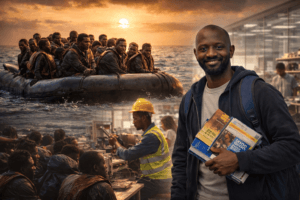EDUPEACE | Listen to Learn
Learning brings about knowledge and knowledge is light. Light dispels darkness as mutual understanding, development, cooperation, peace and security allow humanity to thrive….


Think about it, there is arguably nothing in this life that is as important as learning because every other positive thing flows from it. From information, insights, skills, science and technology to education, entertainment and ideas that add value to living, learning is that activity that animates life. A person who stops learning automatically ceases living. This is why the best theory of learning is that which construes it as a phenomenon that begins at birth and ends with death, a process starting from the cot to the coffin.
Learning brings about knowledge and knowledge is light. Light dispels darkness as mutual understanding, development, cooperation, peace and security allow humanity to thrive. From the art of composition to the percussions of music, the techniques of construction to the advances in medicine, from the fast means of transportation to the dynamics of Big Data and Machine Learning, the theory and application of learning experiences have made our life generally much easier today than it was in the past, though not without its peculiar complications.

As a concept, learning is the process of encountering signals from our senses, attending to them, looking for connections and meanings and framing them so that we may act, as Mark Smith once said. In other words, it is a change in behavior as a result of a new experience or “the process of gaining knowledge and experience”, in the words of Malcolm Knowles, author of The Adult Learner.
The history of human civilization is that of progressive discovery based on activities that entail learning, relearning and continuous learning. It is a local imperative and global desideratum to take learning seriously so that individuals and humanity at large may attain their full potential. To learn, it is important to listen as without listening, in all its connotations, learning cannot take place and all the troubles and crises that pervade our daily life will continue.
To listen, learn and live to the fullest, you must overcome the barriers, both the emotional and the motivational, to learning. The emotional barriers to learning are fear (of criticism, of inadequacy, of judgement, of failure, of rejection, etc.) shame (that you are not good, smart or attractive enough), emotional sensitivity (too much consciousness of yourself and negative disposition to being corrected) and adjustment to change (how can a younger person be my teacher?) Learning, just like peace, is desirable both as an end in itself and a means to an end.
The motivational barriers to learning include feeling out of sync (what is being learnt is above my understanding; I just can’t cope with it all), lack of goal (without short and medium term goals, life continues and nothing new is achieved and no new knowledge is added; so there is need to set goals), procrastination (the greatest thief of time that makes one erroneously feel that time is always available), lack of focus (being distracted from concentration through unproductive habits like spending several hours on the social media for nothing) and poor learning environment (the environment is key as it is a strong enabler and disenabler of learning).
Christopher Morley memorably said, “There are three ingredients in the good life: learning, earning and yearning.” Without realizing the significance of that sequence, many young people assume that since earning comes before learning in the dictionary, they can alter the sequence, begin hustling and jostling to make money before learning. The reality of this misplaced priority manifests in the society, where young people engage in fraud, commit crime and indulge conduct unbecoming in their bid to earn. However, you cannot make an omelet without breaking an egg, you can’t legitimately be earning without learning first.
Therefore, learning comes before the opportunity of earning follows. When the 16th American resident, Abraham Lincoln, said, “I will prepare and some day my chance will come”, what he was saying was that he would learn first, then he would wait for opportunities. “By failing to prepare, you are preparing to fail”, Benjamin Franklin noted. Learning is actually the superpower of the superpowers and the tonic of abundant living.
Learning is significant as it is through it that we understand the basic necessities of life and know the means of getting them. Through learning, we raise our development curve, upscale our social mobility, adapt to new environments, create possibilities for ourselves and others, become more efficient at what we do, gain deeper understanding of subjects, respond to issues and difficulties more creatively, not impulsively, nourish our souls and keep our brain cells alive and active. Just as a body withers away when it is deprived of nutrients, a person declines without learning. In fact, the saying that when you stop learning, you start to die is incontrovertibly true.
Let’s get the bearing right, the first twenty-five years of your life is to be devoted to learning. Afterwards, you remove the “L” and begin to earn and acquire resources through which you live the life you desire. After another twenty-five years or attaining 50 years of age through which you pay your bills and save for the later years, you add “Y” and you yearn more life of harvest, prepare your mind for ease and reflection as you give returns of your experiences back to the society. In these three stages, learning drives life as continuous and life-long learning seeps through the entire life process.
In other words, living the three stages of learning, earning and yearning is living through education, production and relaxation. The production life is the active professional life and everyone looks forward to living on their labor and relaxing in tranquility on the last stage of life. So, listen to learn, dare to earn and prepare to yearn for a glorious ending.
NO COMPETENCE, NO RELEVANCE
Africa is facing a serious challenge of creating some 12 million additional jobs as a way of containing the rising unemployment on the continent. Based on the figures released last year by the President of the African Development Bank (AfDB), Dr Akinwumi Adesina, the number of the unemployed young people in Africa is about 60%. The figure includes those who are even unemployable.
The irony of today is that many young people in Africa and beyond want to earn with empty heads devoid of meaningful learning. They search for jobs and when they are asked of what they can do, they become blank – they just want jobs. This is especially the situation with graduates of tertiary institutions armed with certificates but barren of skills.
What is crucial in today’s life is to learn well and acquire skills that can be converted to earning. It is not enough to memorize bits and chunks of knowledge like the multiplication table and the sonnets of Shakespeare. There must be relevant skills that portray competence in specific areas through which one would attain relevance.
Some multinational companies don’t care about certificates any longer. They are concerned about demonstrable skills and that is the future of work. Without competence and skills, there is no admittance or relevance in the economy. Ultimately, what is important is that everyone should be able to answer the question: what can I do with my education?














More ink to your pen. Please I need councilling on how to develop my reading habit